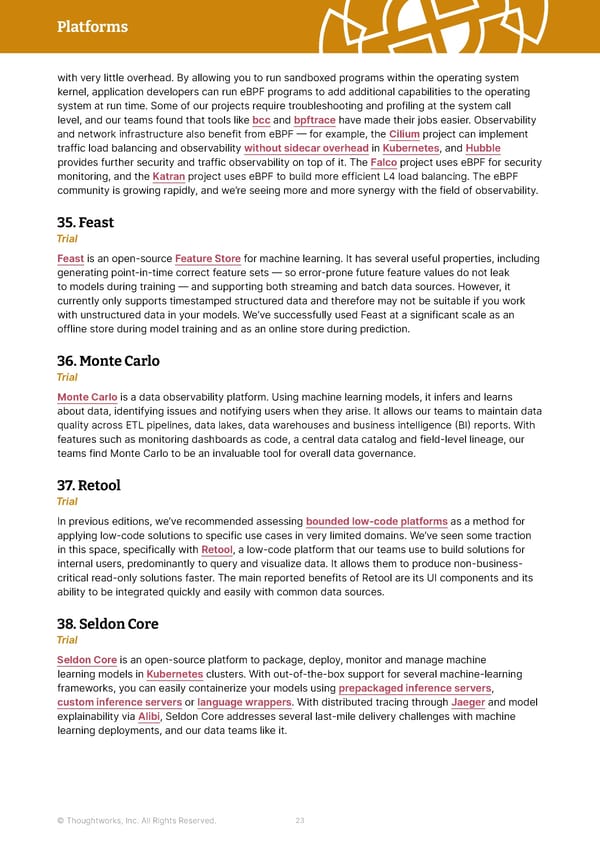Platforms Thoughtworks Technology Radar with very little overhead. By allowing you to run sandboxed programs within the operating system kernel, application developers can run eBPF programs to add additional capabilities to the operating system at run time. Some of our projects require troubleshooting and profiling at the system call level, and our teams found that tools like bcc and bpftrace have made their jobs easier. Observability and network infrastructure also benefit from eBPF — for example, the Cilium project can implement traffic load balancing and observability without sidecar overhead in Kubernetes, and Hubble provides further security and traffic observability on top of it. The Falco project uses eBPF for security monitoring, and the Katran project uses eBPF to build more efficient L4 load balancing. The eBPF community is growing rapidly, and we’re seeing more and more synergy with the field of observability. 35. Feast Trial Feast is an open-source Feature Store for machine learning. It has several useful properties, including generating point-in-time correct feature sets — so error-prone future feature values do not leak to models during training — and supporting both streaming and batch data sources. However, it currently only supports timestamped structured data and therefore may not be suitable if you work with unstructured data in your models. We’ve successfully used Feast at a significant scale as an offline store during model training and as an online store during prediction. 36. Monte Carlo Trial Monte Carlo is a data observability platform. Using machine learning models, it infers and learns about data, identifying issues and notifying users when they arise. It allows our teams to maintain data quality across ETL pipelines, data lakes, data warehouses and business intelligence (BI) reports. With features such as monitoring dashboards as code, a central data catalog and field-level lineage, our teams find Monte Carlo to be an invaluable tool for overall data governance. 37. Retool Trial In previous editions, we’ve recommended assessing bounded low-code platforms as a method for applying low-code solutions to specific use cases in very limited domains. We’ve seen some traction in this space, specifically with Retool, a low-code platform that our teams use to build solutions for internal users, predominantly to query and visualize data. It allows them to produce non-business- critical read-only solutions faster. The main reported benefits of Retool are its UI components and its ability to be integrated quickly and easily with common data sources. 38. Seldon Core Trial Seldon Core is an open-source platform to package, deploy, monitor and manage machine learning models in Kubernetes clusters. With out-of-the-box support for several machine-learning frameworks, you can easily containerize your models using prepackaged inference servers, custom inference servers or language wrappers. With distributed tracing through Jaeger and model explainability via Alibi, Seldon Core addresses several last-mile delivery challenges with machine learning deployments, and our data teams like it. © Thoughtworks, Inc. All Rights Reserved. 23
 Vol 27 | Technology Radar Page 22 Page 24
Vol 27 | Technology Radar Page 22 Page 24